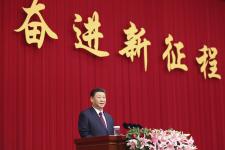
It’s called the Countering Economic Coercion Act of 2023—a measure recently introduced in Congress by Oklahoma U.S. Rep. Tom Cole and two Democrats in the House.
New York Rep. Gregory Meeks and California Democratic Rep. Ami Bera joined Cole in creating the measure.
Their H.R. 1135 would provide the president new tools to provide faster economic support to partners and allies fighting economic coercion from the People’s Republic of China.
Cole is Chairman of the House Rules Committee and got the support of the two Democrats in targeting the threatening actions of China against U.S. allies.
“The People’s Republic of China has repeatedly used economic coercion against United States allies and partners to shape their policies or exact retribution in response to sovereign decisions Beijing does not like,” he explained.

Cole said such threats not only undermined the economies of other countries but directly harmed U.S. interests around the world.
” Beijing’s behavior runs counter to the rules-based system that has been the cornerstone of economic prosperity since the last world war and must be addressed. The Countering Economic Coercion Act of 2023 will provide the president new authorities to respond quickly to these malicious activities, providing tools to both support our allies and partners targeted by economic coercion and to inflict consequences on those employing these tactics.”

The legislation would create the following presidential authorities:
1. Seek congressional appropriations to support foreign aid, export financing and sovereign loan guarantees to foreign partners that are subject to economic coercion;
2. Expedite export licensing decisions and regulatory processes to facilitate trade with affected foreign partners;
3. Decrease duties on non-import-sensitive goods imported by the U.S. from foreign partners that are subject to coercion to make up for lost exports;
4. Increase duties on imports from foreign adversaries committing economic coercion against United States partners and allies; and
5. Waive certain policy requirements to facilitate export financing, allowing the U.S. private sector to meet opportunities in foreign economies suffering from coercion.
The full text of the bill can be found here.



